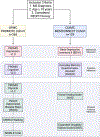Association of personality traits with physical function, cognition, and mood in multiple sclerosis
- PMID: 35134623
- PMCID: PMC8986589
- DOI: 10.1016/j.msard.2022.103648
Association of personality traits with physical function, cognition, and mood in multiple sclerosis
Abstract
Background: Growing literature supports the hypothesis that personality influences health outcomes. Few studies have examined the association between personality traits and key clinical manifestations in persons with multiple sclerosis (pwMS).
Objective: To investigate whether personality traits are associated with physical function, cognition, and depression in persons with MS.
Methods: In this cross-sectional study, we analyzed data from two cohorts (UPMC, n = 365 and CUIMC, n = 129). Participants completed a personality scale (assessing neuroticism, extraversion, openness, agreeableness, and conscientiousness) and validated surveys measuring physical function, cognition, and depression. Stepwise linear regressions were used to evaluate associations between personality traits and outcome measures.
Results: Consistently across cohorts, higher extraversion was associated with better physical function, whereas higher neuroticism was associated with worse depression. In the first cohort, higher extraversion was associated with better cognition, while higher neuroticism was associated with greater risk for memory impairment in the second cohort. Relationships were independent of age and disease duration.
Conclusion: Findings suggest a potentially protective role of extraversion, and a harmful role of neuroticism, in MS-specific patient-reported clinical outcomes. Increased understanding of the interplay between personality and health outcomes may inform risk models for physical decline, cognitive impairment, and depression in pwMS.
Keywords: Cognition; Mood; Multiple sclerosis; Personality traits; Physical function.
Copyright © 2022 Elsevier B.V. All rights reserved.
Conflict of interest statement
The Authors declare that there is no conflict of interest.
Similar articles
-
Multiple sclerosis and personality traits: associations with depression and anxiety.Eur J Med Res. 2024 Mar 12;29(1):171. doi: 10.1186/s40001-024-01772-0. Eur J Med Res. 2024. PMID: 38475891 Free PMC article.
-
Protective personality traits: High openness and low neuroticism linked to better memory in multiple sclerosis.Mult Scler. 2017 Nov;23(13):1786-1790. doi: 10.1177/1352458516685417. Epub 2017 Jan 9. Mult Scler. 2017. PMID: 28067603 Free PMC article.
-
Personality traits in people with multiple sclerosis: A systematic review and meta-analysis.Clin Neuropsychol. 2025 May 27:1-30. doi: 10.1080/13854046.2025.2508476. Online ahead of print. Clin Neuropsychol. 2025. PMID: 40425524 Review.
-
Personality matters: Exploring the associations of personality traits with mood and somatic symptoms in multiple sclerosis.J Psychosom Res. 2025 Feb;189:112022. doi: 10.1016/j.jpsychores.2024.112022. Epub 2024 Dec 20. J Psychosom Res. 2025. PMID: 39729889
-
How personality traits affect functional outcomes in patients with multiple sclerosis: A scoping review on a poorly understood topic.Mult Scler Relat Disord. 2020 Nov;46:102560. doi: 10.1016/j.msard.2020.102560. Epub 2020 Oct 7. Mult Scler Relat Disord. 2020. PMID: 33049463
Cited by
-
Aging-dependent change in Th17 and cytokine response in multiple sclerosis.J Neuroinflammation. 2025 Jun 5;22(1):150. doi: 10.1186/s12974-025-03474-8. J Neuroinflammation. 2025. PMID: 40474243 Free PMC article.
-
Multiple sclerosis and personality traits: associations with depression and anxiety.Eur J Med Res. 2024 Mar 12;29(1):171. doi: 10.1186/s40001-024-01772-0. Eur J Med Res. 2024. PMID: 38475891 Free PMC article.
-
Impact of resilience, social support, and personality traits in patients with neuroinflammatory diseases during the COVID-19 pandemic.Mult Scler Relat Disord. 2022 Dec;68:104235. doi: 10.1016/j.msard.2022.104235. Epub 2022 Oct 9. Mult Scler Relat Disord. 2022. PMID: 36283322 Free PMC article.
-
Longitudinal Digital Phenotyping of Multiple Sclerosis Severity Using Passively Sensed Behaviors and Ecological Momentary Assessments.medRxiv [Preprint]. 2024 Dec 8:2024.11.02.24316647. doi: 10.1101/2024.11.02.24316647. medRxiv. 2024. Update in: J Med Internet Res. 2025 Jun 3;27:e70871. doi: 10.2196/70871. PMID: 39677484 Free PMC article. Updated. Preprint.
-
Factors Associated With the Level of Trust in Health Information Robots Among the General Population From a Socioecological Model Perspective: Network Analysis.J Med Internet Res. 2025 Jun 13;27:e68299. doi: 10.2196/68299. J Med Internet Res. 2025. PMID: 40513089 Free PMC article.
References
-
- Souza A, Kelleher A, Cooper R, et al. Multiple sclerosis and mobility-related assistive technology: Systematic review of literature. J Rehabil Res Dev 2010; 47: 213. - PubMed
-
- Leavitt VM, Cirnigliaro C, Cohen A, et al. Aerobic exercise increases hippocampal volume and improves memory in multiple sclerosis: Preliminary findings. Neurocase 2014; 20: 695–697. - PubMed
MeSH terms
Grants and funding
LinkOut - more resources
Full Text Sources
Medical


